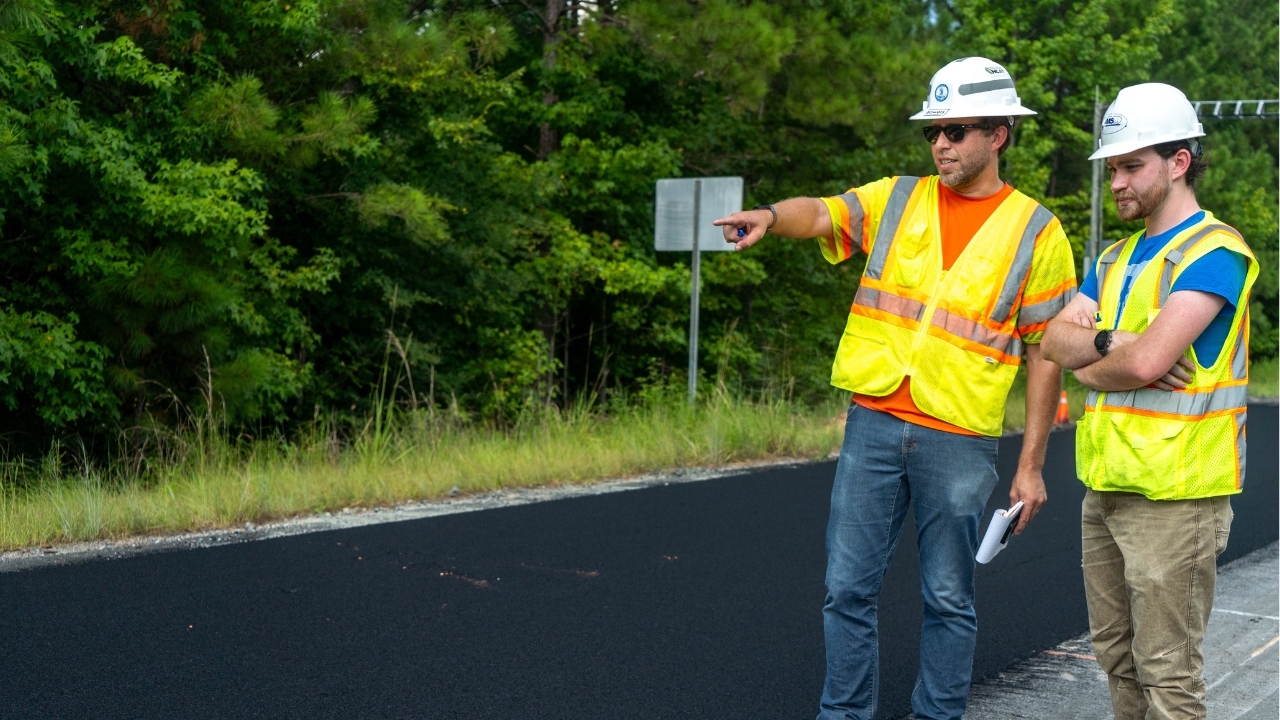A new era of research begins with NCAT’s 9th Test Track cycle
Published: Oct 30, 2024 9:00 AM
By Allison Killingsworth
What do your trips to the grocery store, family visits, deliveries at your doorstep and daily commutes have in common? They all rely on dependable asphalt roads.
The National Center for Asphalt Technology (NCAT) at Auburn University provides essential research and development to meet the needs of maintaining America’s highways. Created to ensure the asphalt industry can deliver pavements that are durable, sustainable, quiet, safe and economical, NCAT’s work has supported the infrastructure that has kept Americans moving for nearly four decades.
Circling innovation
A unique research asset that NCAT has is its Test Track, the only high-speed, full-scale accelerated pavement testing facility in the U.S. and one of only two in the world. This facility develops and tests innovative road-surfacing methods and groundbreaking experimentation conducted by engineers, researchers and students, allowing for the simulation of 6-8 years of heavy interstate-level traffic in two years, all without risking failures on public roads.
Following a successful reconstruction over the summer, the track has entered its 9th cycle of accelerated pavement testing, running from 2024 to 2027, and continuing NCAT’s mission to develop innovative and practical solutions for asphalt pavement performance on local, state and national roadways.
Built in 2000 and located 30 minutes from Auburn’s campus, the 1.7-mile oval is comprised of 46 experimental test sections sponsored cooperatively by highway agencies and private industry on a three-year cycle. Throughout each cycle, loaded trucks generate 10 million equivalent single axle loads (ESALs) on the track. Since operations began in 2000, the trucks have accumulated enough mileage to circle the Earth 440 times.
“High-risk experiments can be conducted here without putting the traveling public at risk on open roads,” said test track manager Jason Nelson. “We are creating tests and specifications to design more sustainable pavements that incorporate high levels of recycled materials. States can integrate these tests into their design procedures to assess road performance, resulting in improved roads for drivers nationwide.”
A wireless network facilitates high-speed data transmission from test sections equipped with strain gauges and pressure plates to track pavement responses. This data informs comparisons across sections and helps refine pavement performance models. Forensic analyses identify causes of any distress at the cycle's end, leading to reconstruction or further evaluation in the next cycle.
Discoveries in the new research cycle
For eight cycles, NCAT has tested innovate materials and helped refine existing specifications and pavement design procedures for a more sustainable highway network. The 9th research cycle continues this trend, featuring cutting-edge experiments that enhance asphalt pavements' durability, safety and sustainability. Key areas of focus for this cycle include:
- Cold Central Plant Recycling (CCPR): This cycle includes new CCPR test sections, including one which re-recycled a previously placed CCPR section. Other CCPR sections feature the use of rejuvenators, including soybean-based rejuvenators from SoyLei Innovative Products and an engineering rejuvenating emulsion from Collaborative Aggregates.
- Asphalt Mixture Additives: This cycle has sections that test the performance of asphalt mixtures enhanced with recycled plastics, ground tire rubber (GTR), aramid fibers and graphene-enhanced additives.
- Friction and Texture: Several sections focus on improving pavement friction and texture, with sponsors investigating innovative asphalt mixtures and surface treatments designed to enhance surface characteristics.
- Soil Stabilization: A unique experiment in this cycle explores the use of enzyme treatments to stabilize expansive subgrade soils, reducing the need for traditional stabilizing agents like cement and lime.
- Sustainability: Various sections feature sustainable materials, such as high-recycled-content asphalt mixes and spray-on rejuvenators. Sponsors use the track to evaluate innovative methods to extend pavement life while reducing environmental impact.
- Durability and Performance: Multiple sponsors are focusing on improving the performance and longevity of asphalt pavements by evaluating new binder grades, mix types and innovative design approaches.
A new era at NCAT
This cycle marks a significant milestone for NCAT as it embarks on a new era of research, training and leadership. With the retirement of former associate director Buzz Powell, a new generation of NCAT staff has stepped into leadership roles, bringing with them a commitment to advancing the science of asphalt pavement in line with NCAT’s mission. Nathan Moore was appointed assistant director for research at the Test Track in April 2024 and managed the construction of the new test sections for this cycle.
“I am excited and honored to have stepped into this role at the Test Track. The two months of construction were intense and our team, many of them new to their roles, stepped up to the challenge and did an incredible job. I am very proud of our staff of engineers, technicians, students and drivers. I’m looking forward to continuing the tradition of excellence at the NCAT Test Track.”
Established in 1986 through a collaboration between Auburn University and the National Asphalt Pavement Association’s Research and Education Foundation, NCAT was founded to address the needs of maintaining America's pavement infrastructure through practical research and development initiatives. The center’s mission is to provide innovative, relevant and implementable research, technology development and education that advances safe, durable and sustainable asphalt pavements.
The NCAT Test Track is a national research proving ground for asphalt pavements. Highway agencies and industry sponsors fund research on the 1.7-mile oval in 200-foot test sections. This real-world laboratory allows for cutting-edge experimentation while avoiding the risk of failure on actual roadways. Read more about test track research on NCAT’s website.
Media Contact: , alk0049@auburn.edu, 334.332.5052
Benjamin Bowers, (left) associate professor in the department of civil and environmental engineering at Auburn University and graduate student Ben Prowell (right) during construction of the 9th Test Track cycle.

